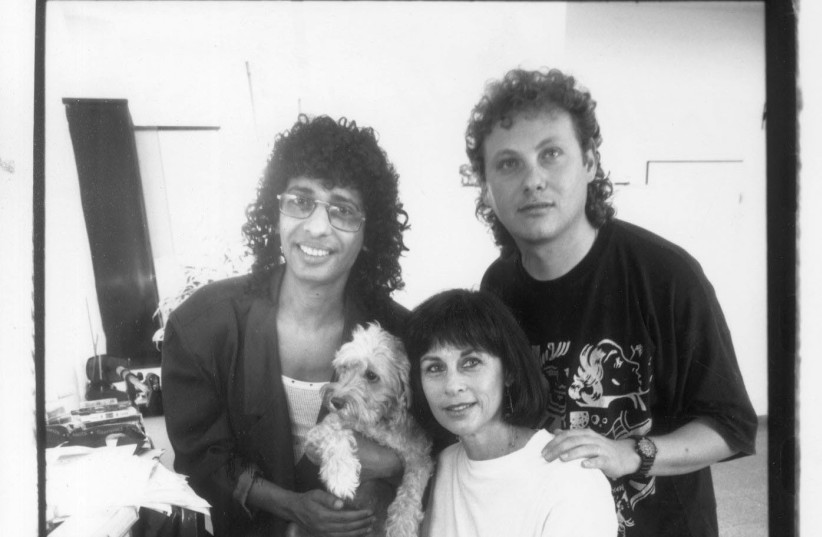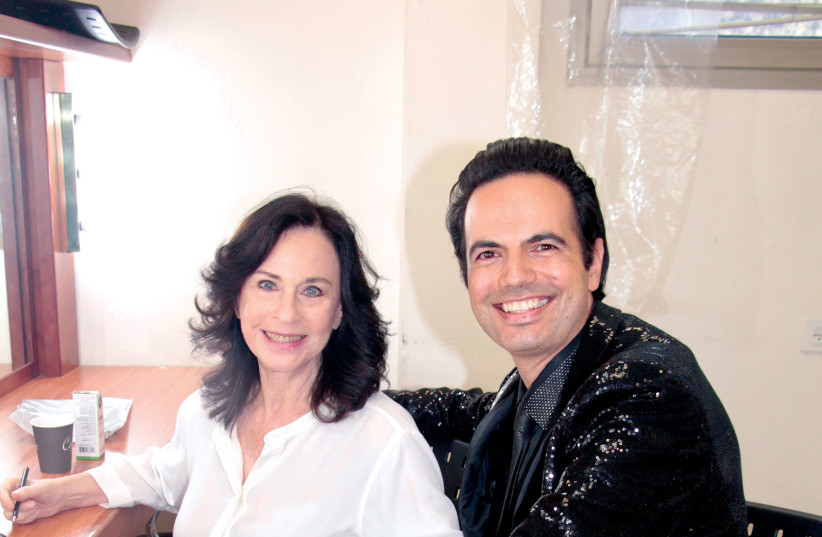When the writers of the hit Broadway musical Come From Away wanted to add a Jewish touch, the choice was a no-brainer.
“Oseh Shalom Bimromav, Hu Ya’aseh Shalom Aleinu” (He who makes Peace in the Heights, He will make peace for us) has been sung since the Second Temple; there’s Talmudic debate whether Priests of the First sang it as they sacrificed. The melody is chanted in synagogues around the world; Jews everywhere belt it out after filling their bellies. The haunting tune was born in the blood of the ancient Hebrews, before the stay in Egypt.
Right? Wrong.
The music to the liturgical lyrics has only been around since 1969 when Nurit Hirsh, Israel’s beloved uber-songwriter, conductor, and brilliant performer, drew on her hassidic roots (her maternal grandparents were followers of Rabbi Dovid of Lelov) and penned what quickly became an anthem of Judaism. But liturgical tunes is only one part of Hirsh’s astonishing talent. Apart from hazzanut, she finds inspiration in African American music, the Bee Gees, rock, her “god” Umm Kulthum and Arabic rhythms and, of course, the Yemenite dance beat that runs through her milk-and-honey Land of Israel classics. (She’s also a professional folk dancer.)
With more than 1,600 hits to her credit, it’s hard to know where to start listing them. “Bashana Haba’a,” perhaps, the upbeat megahit with lyrics by Ehud Manor, which promises a year to come that will be better than this one. When Manor asked her to orchestrate his lyrics, he didn’t tell Hirsh that he’d written it as a memorial to his brother, Yehuda Viner, who was killed in battle in 1968. The optimistic beat belies the pain, while also alleviating it. Hirsh and Manor’s huge repertoire of collaboration includes the glorious “A-Ba-Ni-Bi” – the gibberish “I love you” smash success that gave Israel its first Eurovision win in Paris in 1978.

“We never dreamt we had a chance of victory, and Ehud didn’t even want to go to Paris. I was conducting the orchestra – the first time a woman had conducted in a Eurovision; and also the first time that a woman had orchestrated the music itself – and I insisted he come and see Yizhar Cohen perform our song.”
Nurit Hirsh
“We never dreamt we had a chance of victory,” recalls Hirsh, now an unbelievably youthful 80, “and Ehud didn’t even want to go to Paris. I was conducting the orchestra – the first time a woman had conducted in a Eurovision; and also the first time that a woman had orchestrated the music itself – and I insisted he come and see Yizhar Cohen perform our song.” Manor agreed, arriving at the show viewed by hundreds of millions wearing “peasant’s shorts, a shapeless T-shirt and sandals.” As the voting progressed and Israel’s douze points mounted up, Hirsh started to panic. “I instructed Ehud to slip out of the hall and exchange clothes with my husband as quickly as he could,” she laughs. “Luckily, my husband was wearing a brown velvet suit he’d bought that day in Paris. It didn’t fit Ehud at all, but it was better than what he was wearing!”
Making the world a happier place for over 60 years
Hirsh, who has been known to dash off 35 songs a month and sometimes four a day, has been making the world a happier place for well over sixty years. After her IDF service in an entertainment band, she studied composition at the Tel Aviv Academy of Dance, and then orchestration under world-renowned composer, conductor and arranger Noam Sheriff. When her husband, Yoram Rosenfeld, was sent as economic consul to Los Angeles, she continued her musical education in the States, studying composition, movie and electronic music, and listening to some of the world’s best jazz.
Then she came back to Israel to write the music for Israeli rock classics like “Hashmal Zorem Bechapot Yadecha” (“Electricity flows through your palms”); huge hits for the Oscar-nominated Ephraim Kishon film The Policeman (“The Policeman’s Ballad”); and Israel’s first Eurovision entry, “Sham” (“There”), in 1973, which placed fourth, one rank lower than Cliff Richard, and is still a staple of radio play lists until today. She’s won too many awards to catalogue, including the Israel Prize, and hundreds and hundreds of her songs are the soundtrack to every Israeli’s life: Children in nurseries sing “Bo Elai Parpar Nechmad” (“Come to me, sweet butterfly”) and countless other adored children’s classics. Adults know her music like they know the electricity that flows in the palms of their own hands. Her tribute concerts, now playing around the country, are one exuberant sing-along, with the audience erupting in joy as the musicians strike the introductory chords of each song.
Life has not always been entirely “you will see, you will see, just how good it will be” for Hirsh. Her husband died in his forties from cancer, leaving her a very young widow. But, in the words of her great friend and also iconic songwriter Naomi Shemer, she got up every morning and started again from the beginning, making music for us to live by. Her children have inherited the talent gene. Her daughter Ruth Rosenfeld is an actress and opera singer in Berlin; and son Dani Rosenfeld is a renowned Tel Aviv jazz musician and faculty member of JAMD.
Eighteen years ago Yediot Aharanot ran a feature about Hirsh’s fame. Her present partner, Moishik Linden, a widower from Kfar Saba, had read the article and fell in love with the powerhouse packed into one meter fifty-five (“I used to be 1.57, but I’m shrinking”), who conducted the Israeli Philharmonic at the age of age 22; can pop out a hit record in half an hour (fully orchestrated, of course); can play the piano, darbouka, accordion, and clarinet; runs music programs for schools; and is adored by every faction of Israelis, even though they can’t agree on much else.
Hirsh’s history with the Jewish people and the country she writes about runs deep.
Her maternal family escaped to Israel from Poland just before the Holocaust and the murder of many cousins; her opera-singer and violinist father arrived in Palestine with his immediate family around the same time from Czechoslovakia. In Israel, he opened a well-known fountain pen shop; Meir Shalev penned some of his flowing prose with one of them.
“I was born into a beautiful country full of a wonderful generation who built the land,” says Hirsh. “There was unity and great music; we felt safe and that we were living a meaningful life.” Her music reflects this love of the land and love of all the people, from policemen to parparim (butterflies).

Hirsh is currently touring the country with singer/producer Isaac Sutton, who’s half her age, to sold-out shows. His trademark glittery jackets highlight her simple black slacks and white blouse. They are joined on the tour by lovely opera singer Tal Bergman and a trio of great musicians. The audience joins in with every syllable of every song. “Wow,” said an enthused grandpa at a recent performance, who hadn’t stopped singing for two hours. “Just wow.”
If you fancy two hours of peace, for us and for all of Israel, you might not even need any help from on high. Just wangle a ticket for the Hirsh/Sutton spectacular before the run finishes. And yes, if you’re wondering, the Broadway producers added Hirsh to the credits and invited her to see the show. ■
Dr. Pamela Peled lectures at Reichman University and Beit Berl College. peledpam@gmail.com
